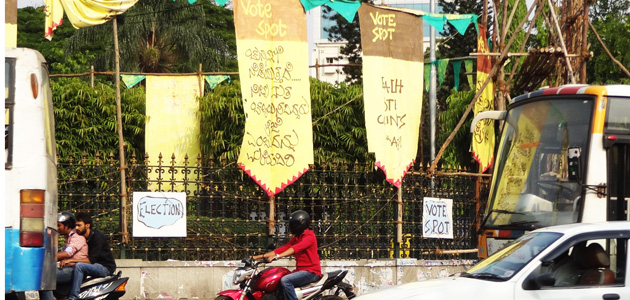India has passed the half-way point in its chaotic elections where 814 million people are registered to vote. The last polling day is 12 May and results will be announced on 16 May.
One of the big questions is how the newly elected politicians will deliver on their campaign promises to tackle corruption. Too often those who speak up about corruption face reprisals and inaction.
Take Ruti, a 65-year-old widow who lives in Neori village. Home to just 218 people, the village is located in Jahrkhand, a state in eastern India. She is entitled to a widow’s pension but until she received help from Transparency International India, the local authorities had done nothing to help her.
One day back in September 2012, Neori’s population swelled to more than 2,500 when people from the region poured into the village to attend a help day on corruption in daily life, organised by our national chapter and local law students.
People spoke of not being able to get papers to confirm they own the land they live on; farmers complained about not receiving subsidies they are entitled to. Ruti explained her situation and found out how to get her pension paid.
People in Neori and all over India are fed up with corruption. One in two Indians had to pay bribes when dealing with public authorities, according to a global Transparency International survey released in 2013.
Politics is often seen as a big part of the problem, not the solution. People mistrust political parties: 86 per cent of Indians believe that their political parties are corrupt. And they are right. More than 30 per cent of members of the BJP and Congress parties in the lower house of the Indian parliament reportedly face criminal charges. The BJP and Congress are India’s biggest political parties.
Unfortunately the election season only adds to this concern. People will see candidates ignoring election spending limits; voters will be offered bribes for their votes, including TVs, cheap rice and other gifts.
It’s no wonder a political party has emerged on a single-issue anti-corruption ticket. It won the local New Delhi elections in December, tapping into the frustration that ordinary citizens feel every day.
For whoever wins the general election, the challenge will be turning their campaign commitments into reality.
Here are three key areas where action should be taken quickly:
First, put more information in the hands of the people.
Ordinary people need the power to fight back. The government should help educate citizens on how to use India’s 2005 Right to Information Law, one of the best in the world, to hold politicians and civil servants to account.
Requests for information about public decisions can unblock applications for licences and entitlements, and even speed up public works.
An estimated four million Indian citizens used it to seek information from public authorities in 2011-12. That is great progress, but only accounts for 0.3 per cent of India’s population.
But the government should also be proactive in publishing more information too, something that the act also mandates.
Second, whistleblowers need greater protection
The new Whistleblower Protection Act must be amended to apply to both the private and public sectors, and it must do more to safeguard those who speak up.
Today the law only applies to public sector employees. In addition, whistleblowers are forced to reveal their identity, putting themselves at great risk of retaliation if they expose wrong-doing.
Third, corruption must not pay
If ordinary Indians blow the whistle or request access to information that exposes corruption, the next government will have to ensure people who are charged go to jail. The judiciary needs more resources, despite recent efforts to speed up proceedings.
Today there is a case backlog of 31 million in the country’s courts that prompted one judge to estimate it would take 320 years to clear. India has about 14 judges for every million people in the country compared to 100 per million in the United States.
A well-resourced judiciary is vital for fighting corruption. If the judicial process is so drawn out, criminals will assume that they will never be held to account.
India’s politicians need to channel this energy into constructive change. Empowering greater access to information and protecting whistleblowers would be good first steps.
Publishing more information about political party financing would also show India’s millions of voters who they are aligning their votes with as they go to the polls.
Carousel image: Creative commons, Flickr / Dave Lonsdale
















 Connect with us on Facebook
Connect with us on Facebook Follow us on Twitter
Follow us on Twitter